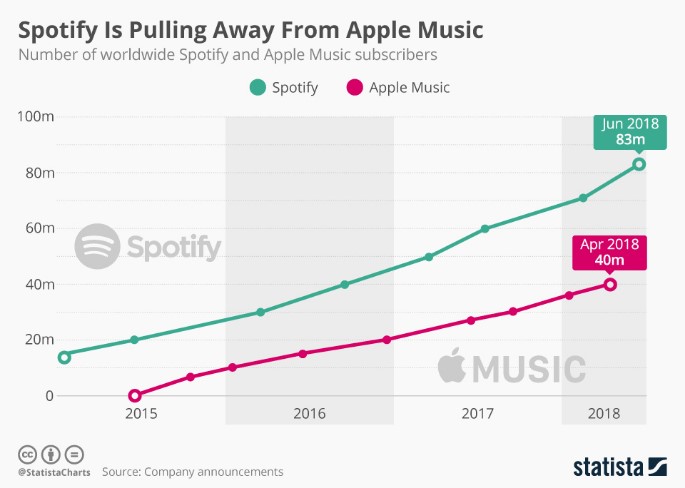Stock market newbie Spotify Technology SA (NYSE:SPOT) has presented its second earnings report since going public in April, and despite some results that missed the mark, investors are enthusiastic.
Why? Because the results help dispel the common myth that Apple (NASDAQ:AAPL) Music is eating Spotify’s lunch, especially in the U.S. market.
The Swedish music streaming giant said that it finished the second quarter with 83 million paying subscribers--one million more than what Wall Street was expecting and more than double the 40-million tally that Apple disclosed in its April report.
More importantly, the company is making loads of cash off paying subscribers with premium subscription revenue toping expectations after climbing 27 percent to 1.15 billion euros ($1.34 billion).
In fact, rather than losing ground to Apple Music, Spotify is actually pulling away at an alarming clip. In 2015, Spotify had 20 million more paying subscribers than Apple Music—three years down the line the gap has widened to 40 million.

(Click to enlarge)
Source: Statista
Ad-supported service revenue was much weaker at 123 million euros, well below the 138 million consensus.
With strong brand recognition and a massive installed base, Apple Music appeared to be an unstoppable force upon its release three years ago. Yet, Spotify has proven to be a worthy adversary especially with its ability to integrate new no-commitment methods of engaging customers.
Related: Twitter In A Tailspin On Disappointing Earnings Report
For instance, Spotify’s free ad-supported service allows customers to try it out before committing to a premium subscription. Apple Music lacks such an option.
The company has provided full-year forecast for total monthly active users—including non-paying ones—of 190 million to 207 million. With churn in important markets like the U.S. falling (less than four percent during the second quarter), the huge customer base gives the company ample growth runways as non-paying subscribers convert to paying ones.
Piling Losses
The digital music model might seem sexy on paper: Build a solid backend platform integrated with servers and cloud storage, negotiate licensing deals with record labels, store the music then stream requested tracks to millions of customers while collecting monthly subscriptions. In the real world, however, it’s anything but sexy—streaming companies are mostly unprofitable.
Nine years after its founding, Spotify is still burning through enormous amounts of cash and with losses widening even as it grows its subscriber base.
Spotify reported a loss of 90 million euros for the second quarter, more than double the first quarter’s loss of 41 million euros--though a good chunk came from the company’s listing costs.
Although the company has been doing its best to negotiate better licensing deals with rights holders—labels, publishers and songwriters—licensing costs are still very high. In December, the company announced that it had paid out $9.76 billion in royalties since its inception.
And it might get worse if publishing companies and songwriters get their way. These players are now saying that the current model where payouts are tied to a portion of the company’s revenue is ridiculous and they would prefer to negotiate lumpsum amounts.
Related: UK Motorists Not Interested In EVs
While many tech companies that provide streaming services such as Apple and Tesla (NASDAQ:TSLA) would probably not mind such an arrangement, it would be harmful to a company like Spotify. In late January, the Copyright Royalty Board (CRB) agreed to boost rates for interactive streaming by nearly 50 percent over the next five years.
On a brighter note, Spotify’s gross margin has been gradually expanding over the years. As long as this trend holds, the company will at some point eventually become profitable.

(Click to enlarge)
Source: Recode
By Alex Kimani for Safehaven.com
More Top Reads From Safehaven.com
















